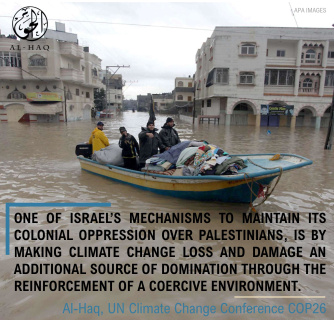
This brief is part of a series on climate change, its adverse effects and the Israeli colonial-apartheid regime, published in the context of the UN Climate Change Conference COP26.
Date: 10 November 2021
In the Preamble of the Paris Agreement, State parties agreed, “when taking action to address climate change, [to] respect, promote and consider their respective obligations on human rights, the right to health, the rights of indigenous peoples, local communities, migrants, children, persons with disabilities and people in vulnerable situations and the right to development [...].”
As reflected in the State of Palestine’s National Adaptation Plan, climate change will severely impact the Palestinian landscape, with a majority of loss and damages - not avoidable through adaptation and mitigation - likely to be felt in the domain of water availability and quality, and land, not to mention their knock-on repercussions in all sectors, including agriculture, food, biodiversity, coastal and marine, energy, gender, health, industry, terrestrial ecosystems, tourism, waste and wastewater.
Addressing climate change-related loss and damage requires taking due consideration to human rights and climate justice, as their impacts will be felt tremendously by peoples, and will undermine their capacity to exercise their socio-economic rights, including their rights to life, water, food security, health, livelihood, healthy environment, as well as the disposal of their natural resources.
One of Israel’s mechanisms to maintain its colonial oppression over Palestinians, is by making climate change loss and damage an additional source of domination through the reinforcement of a coercive environment. Farming communities in the desertifying Jordan Valley entirely rely on crops and livestock, severely curtailed by water shortage. Water scarcity is exacerbated by water restrictions imposed by the Israeli Occupying Power, while nearby settlers enjoy full water access and advanced irrigation technologies.[1] Israel’s oppression not only aggravates climate change vulnerabilities, but exacerbates loss and damage to entrench its territorial control.
Because colonialism is a main source enhancing peoples’ vulnerabilities, forcing them to deal with increasingly scarce natural resources that are at the core of their identities and their relationship to their lands, and weakening their adaptive capacities, it is absolutely essential to address loss and damage within the framework of human rights.
As such, Al-Haq joins and supports ESCR-Net recommendations to Parties to the UNFCCC, and especially to integrate human rights in decisions to avert, minimize and address loss and damage:
- Adopting an intersectional approach that will duly consider the most vulnerable and marginalized groups, often disproportionately affected by loss and damage, including peoples living in conflict-affected areas, including situations of occupation and apartheid;
- Ensuring the rights to self-determination and participation, as peoples have a fundamental right to shape responses to loss and damage, especially when it affects their disposal of their natural resources;
- Strengthen and update human rights and corporate accountability frameworks in light of climate change, especially regulating their activities in occupied territories;
- Act ambitiously on mitigation and adaptation to reduce the future scale of loss and damage;
- Center human rights in environmental decision-making within international multinational organizations and financial institutions.
Read the full brief here.
[1] See ICRC, “Climate Change and Bedouin Communities in the Jordan Valley,” 18 August 2021, https://www.icrc.org/en/document/climate-change-and-bedouin-communities-jordan-valley

